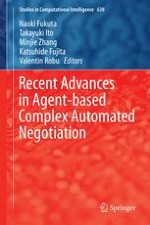This book covers recent advances in Complex Automated Negotiations as a widely studied emerging area in the field of Autonomous Agents and Multi-Agent Systems. The book includes selected revised and extended papers from the 7th International Workshop on Agent-Based Complex Automated Negotiation (ACAN2014), which was held in Paris, France, in May 2014. The book also includes brief introductions about Agent-based Complex Automated Negotiation which are based on tutorials provided in the workshop, and brief summaries and descriptions about the ANAC'14 (Automated Negotiating Agents Competition) competition, where authors of selected finalist agents explain the strategies and the ideas used by them. The book is targeted to academic and industrial researchers in various communities of autonomous agents and multi-agent systems, such as agreement technology, mechanism design, electronic commerce, related areas, as well as graduate, undergraduate, and PhD students working in those areas or having interest in them.
